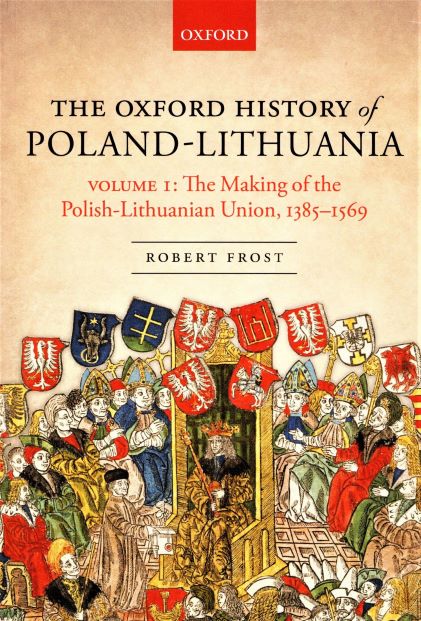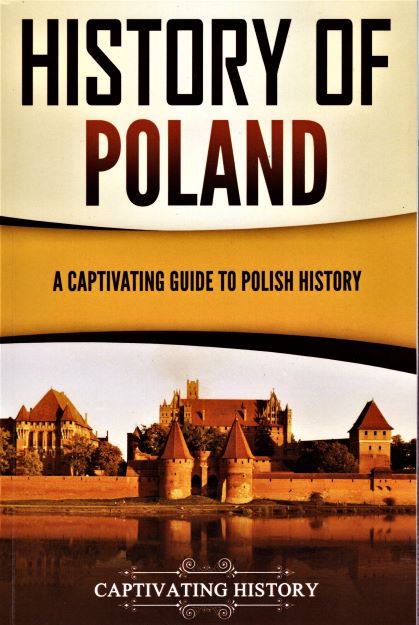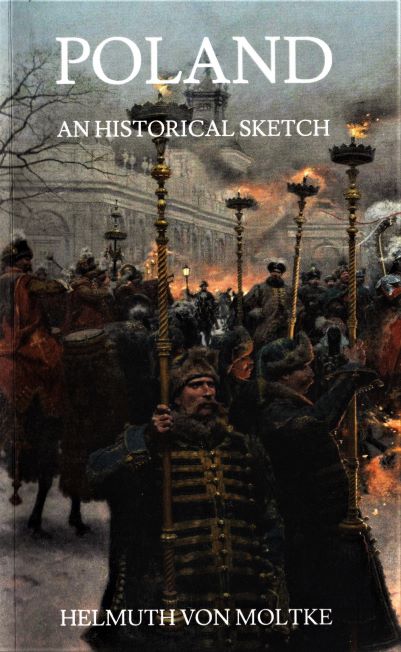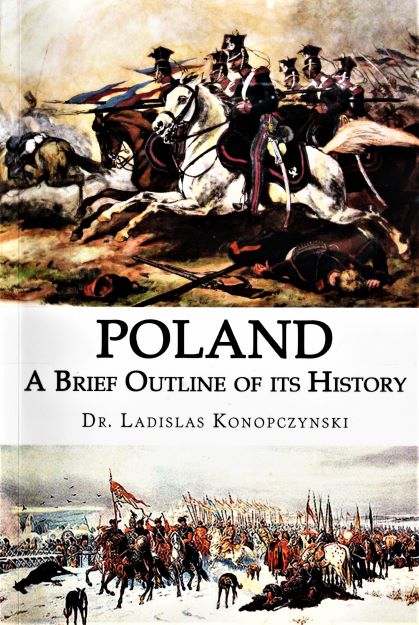marion kanawha
29 Oct 2023
History / Recommended Poland's history books [257]
THE FIRST PARTITION OF POLAND, Herbert H. Kaplan, 1962.
This book claims to be the first book published about the First Partition since a German-language book was published in 1873. The German book DID NOT bother to use Polish or Russian references. That's interesting!!!
Concerning this book you need to realize that it was written in 1962. References to Polish primary sources are still minimal but are referenced.
The book is very readable and the narrative of events are straight forward. See the picture of the page of the table of contents.
For this history 1762 was the pivotal starting date: Catherine (the Great) came to the throne; August III of Poland died; France and Austria lost the Seven Years War, a major war that many historians consider a true world war. It's this war that created the world order up till 1815.
There is a nice summary of Polish Events from 1717-33 (the "Dark Ages") and from 1734-63 which covered the pro-Russian vs other factions in internal politics of Poland.
Since this history takes a deep dive into a small period of time (1762-1772) lots of details are covered that would not be found in general histories of Poland, even scholarly in-depth works (in English).
Since I'm relatively new in studying Polish history, a few things were quite revealing to me. FIRSTLY, how Russia kept meddling into internal affairs to preserve the DISSIDENTS (Orthodox and Protestants) role in internal politics. I have heard of this but never had the opportunity to study it closely like this book covers.
SECONDLY, the confederations that sprang up to combat this Russian meddling. The most famous was the Bar Confederation. I thought this was the only one. It was one of only many, many regional confederations. These confederations were conservative, one might say right-wing, very Catholic to the point of medieval crusaders. The problem was that they were not well organized and came across as a bunch of brigands. They did not impress those who might aid them: France and Turkey.
THIRDLY, and this is the MOST DECISIVE POINT, because the confederates were irregulars they would cross borders to escape the Russians. Crossing over into Austrian territory was nice and easy. So the Austrians decided to take a little chunk of Polish territory to safeguard their border. The civil war in Poland (the confederations vs the king & Russians) created an excuse for the powers to protect their borders. What Austria did (almost casually) by this small action was upset the balance of power and SET INTO MOTION THOUGHTS OF PARTITION.
FOURTHLY the book is basically the ongoing diplomatic wrangling between Russia and Prussia then later Austria over partitions and how it would affect the balance of power in the world. Poland was in such a chaotic state that the neighbors felt they had to do something.
FIFTHLY is the decision to partition. Very casually, almost jokingly, the idea came up to partition. It was in Russian court notes then made its way into diplomatic correspondence between Russia and Prussia. It was Frederick (the Great) who bit down on this idea and would not let go. To dismember Poland would create a smaller, more manageable area. Frederick was the prime mover in Poland's dismemberment. Again, the decisive move was Austria's take on a piece of Poland. This is what spurred Frederick on and what made him involve Catherine (the Great) to take action. The book then covers the actions of who was to get what and how would the world react to the First Partition.
The author makes some points that really jumped out at me. I have to admit they are quite harsh!
1.)LIBERTY. Poles really had no concept of liberty. There was a courageous spirit expressed in speeches and pamphlets but rarely in defense of a nation (patriotism?) but rather a defense, a preservation, of self-interests. The Bar Confederation seems to be a prime example.
2.)CORRUPTION. By the 18th century the Poles were morally and ethically bankrupt. For such a religious people, they rivaled (if not surpassed) today's corrupt Third World countries. "Jingle a bag of coins and they could be bought."
3.)RUSSIA. Believe it or not the author says the Russians were the losers in this partition. After 1717 Russia pretty much had control over the Commonwealth. But Catherine and her ministers were not savvy enough in dealing with Frederick, his ministers and the Austrian diplomats. That's why Prussia for example was able to obtain a valuable share while Russia got lots of empty land. I found that point interesting and enlightening.
THE FIRST PARTITION OF POLAND, Herbert H. Kaplan, 1962.
This book claims to be the first book published about the First Partition since a German-language book was published in 1873. The German book DID NOT bother to use Polish or Russian references. That's interesting!!!
Concerning this book you need to realize that it was written in 1962. References to Polish primary sources are still minimal but are referenced.
The book is very readable and the narrative of events are straight forward. See the picture of the page of the table of contents.
For this history 1762 was the pivotal starting date: Catherine (the Great) came to the throne; August III of Poland died; France and Austria lost the Seven Years War, a major war that many historians consider a true world war. It's this war that created the world order up till 1815.
There is a nice summary of Polish Events from 1717-33 (the "Dark Ages") and from 1734-63 which covered the pro-Russian vs other factions in internal politics of Poland.
Since this history takes a deep dive into a small period of time (1762-1772) lots of details are covered that would not be found in general histories of Poland, even scholarly in-depth works (in English).
Since I'm relatively new in studying Polish history, a few things were quite revealing to me. FIRSTLY, how Russia kept meddling into internal affairs to preserve the DISSIDENTS (Orthodox and Protestants) role in internal politics. I have heard of this but never had the opportunity to study it closely like this book covers.
SECONDLY, the confederations that sprang up to combat this Russian meddling. The most famous was the Bar Confederation. I thought this was the only one. It was one of only many, many regional confederations. These confederations were conservative, one might say right-wing, very Catholic to the point of medieval crusaders. The problem was that they were not well organized and came across as a bunch of brigands. They did not impress those who might aid them: France and Turkey.
THIRDLY, and this is the MOST DECISIVE POINT, because the confederates were irregulars they would cross borders to escape the Russians. Crossing over into Austrian territory was nice and easy. So the Austrians decided to take a little chunk of Polish territory to safeguard their border. The civil war in Poland (the confederations vs the king & Russians) created an excuse for the powers to protect their borders. What Austria did (almost casually) by this small action was upset the balance of power and SET INTO MOTION THOUGHTS OF PARTITION.
FOURTHLY the book is basically the ongoing diplomatic wrangling between Russia and Prussia then later Austria over partitions and how it would affect the balance of power in the world. Poland was in such a chaotic state that the neighbors felt they had to do something.
FIFTHLY is the decision to partition. Very casually, almost jokingly, the idea came up to partition. It was in Russian court notes then made its way into diplomatic correspondence between Russia and Prussia. It was Frederick (the Great) who bit down on this idea and would not let go. To dismember Poland would create a smaller, more manageable area. Frederick was the prime mover in Poland's dismemberment. Again, the decisive move was Austria's take on a piece of Poland. This is what spurred Frederick on and what made him involve Catherine (the Great) to take action. The book then covers the actions of who was to get what and how would the world react to the First Partition.
The author makes some points that really jumped out at me. I have to admit they are quite harsh!
1.)LIBERTY. Poles really had no concept of liberty. There was a courageous spirit expressed in speeches and pamphlets but rarely in defense of a nation (patriotism?) but rather a defense, a preservation, of self-interests. The Bar Confederation seems to be a prime example.
2.)CORRUPTION. By the 18th century the Poles were morally and ethically bankrupt. For such a religious people, they rivaled (if not surpassed) today's corrupt Third World countries. "Jingle a bag of coins and they could be bought."
3.)RUSSIA. Believe it or not the author says the Russians were the losers in this partition. After 1717 Russia pretty much had control over the Commonwealth. But Catherine and her ministers were not savvy enough in dealing with Frederick, his ministers and the Austrian diplomats. That's why Prussia for example was able to obtain a valuable share while Russia got lots of empty land. I found that point interesting and enlightening.
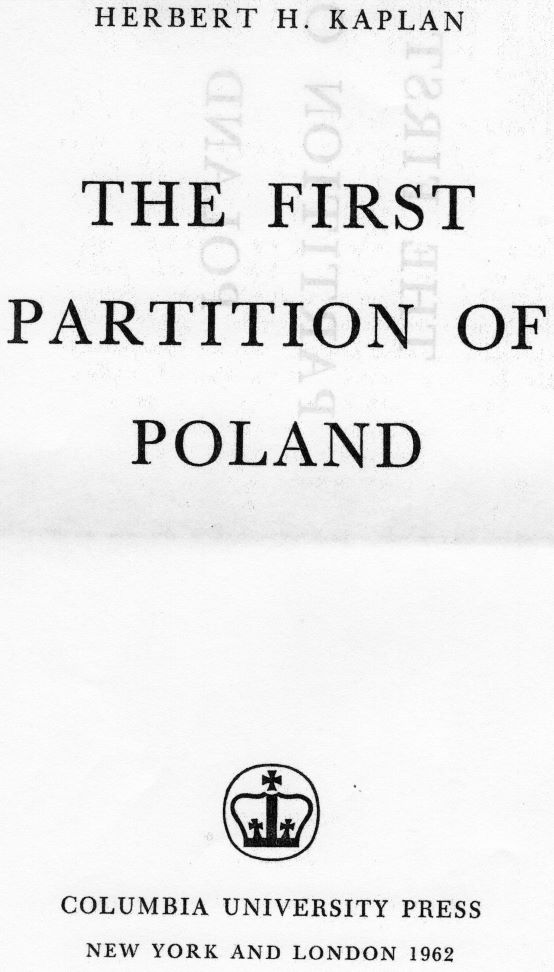
img20231029_17003072.jpg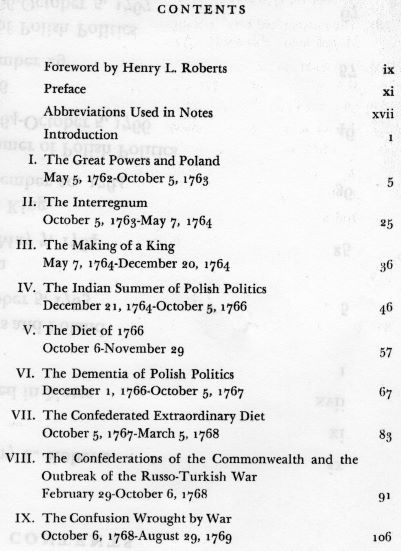
img20231029_17030333.jpg


